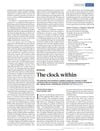Circadian Clock-Mediated Control of Stem Cell Division and Differentiation: Beyond Night and Day
August 2014
in “
Development
”
circadian clock stem cell division stem cell differentiation cell division wound healing immune progenitor differentiation mitochondrial activity clock proteins transcription translation circadian rhythms adult stem cell populations cell fate decisions tissue homeostasis circadian clock genes tissue renewal tissue regeneration

TLDR The circadian clock is crucial for tissue renewal and regeneration, affecting stem cell functions and having implications for health and disease.
The document from August 15, 2014, reviews the significant role of the circadian clock in regulating stem cell division and differentiation, extending beyond its traditional role in synchronizing with the 24-hour day. It explains that the circadian clock influences about 10% of genes in each tissue, affecting processes such as cell division during wound healing, immune progenitor differentiation, and mitochondrial activity. The circadian clock's molecular basis involves feedback loops of transcription and translation, with clock proteins regulating the transcription of other clock genes. The review also notes that circadian rhythms play a role in adult stem cell populations, affecting cell fate decisions and tissue homeostasis. While disruptions in circadian clock genes do not prevent the birth of normal mice, indicating a lesser role during embryogenesis, deficiencies in these genes can lead to pathologies like diabetes, arthritis, and cancer in adults. The document concludes that circadian regulation is crucial for tissue renewal and regeneration and suggests that further research is needed to understand the broader implications for physiology and medicine.





